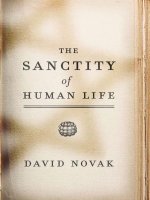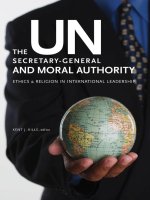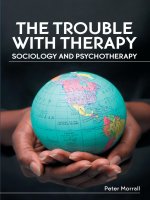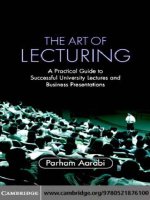georgetown university press the un secretary-general and moral authority ethics and religion in international leadership dec 2007
Bạn đang xem bản rút gọn của tài liệu. Xem và tải ngay bản đầy đủ của tài liệu tại đây (1.6 MB, 381 trang )
THE UN SECRETARY-GENERAL
AND MORAL AUTHORITY
THE UN SECRETARY-GENERAL
AND MORAL AUTHORITY
Ethics and Religion in International Leadership
kent j. kille, editor
GEORGETOWN UNIVERSITY PRESS washington, d.c.
Georgetown University Press, Washington, D.C. www.press.georgetown.edu
© 2007 by Georgetown University Press. All rights reserved. No part of this book
may be reproduced or utilized in any form or by any means, electronic or mechanical,
including photocopying and recording, or by any information storage and retrieval
system, without permission in writing from the publisher.
Library of Congress Cataloging-in-Publication Data
The UN Secretary-General and moral authority : ethics and religion in international
leadership / edited by Kent J. Kille.
p. cm.
Includes bibliographical references and index.
ISBN-13: 978-1-58901-180-9 (alk. paper)
1. International relations — Moral and ethical aspects. 2. Political leadership — Moral
and ethical aspects. 3. United Nations. Secretary-General. I. Kille, Kent J.
JZ1306.U55 2007
172.4 — dc22
2007011204
This book is printed on acid-free paper meeting the requirements of the
American National Standard for Permanence in Paper for Printed Library Materials.
14 13 12 11 10 09 08 07 9 8 7 6 5 4 3 2
First printing
Printed in the United States of America
To the vision of Harold Guetzkow and
In memory of Charles S. McCoy
CONTENTS
Acknowledgments ix
Introduction
kent j. kille 1
1 Moral Authority and the UN Secretary-General’s
Ethical Framework
kent j. kille 7
2 Seeking Balance: The Secretary-General as
Normative Negotiator
dorothy v. jones 39
3 The House That Trygve Lie Built: Ethical Challenges as
the First UN Secretary-General
james p. muldoon jr. 67
4 The UN Charter, the New Testament, and Psalms:
The Moral Authority of Dag Hammarskjöld
alynna j. lyon 111
5 U Thant: Buddhism in Action
a. walter dorn 143
6 An Ethical Enigma: Another Look at Kurt Waldheim
michael t. kuchinsky 187
7 Religion, Ethics, and Reality: A Study of
Javier Perez de Cuellar
barbara ann rieffer-flanagan
and david p. forsythe 229
8 A Realist in the Utopian City: Boutros Boutros-Ghali’s
Ethical Framework and Its Impact
anthony f. lang jr. 265
9 Politics and Values at the United Nations:
Kofi Annan’s Balancing Act
courtney b. smith 299
10 The Secular Pope: Insights on the
UN Secretary-General and Moral Authority
kent j. kille 337
Contributors 355
Index 361
ix
ACKNOWLEDGMENTS
The first and most important acknowledgment is to Harold Guetzkow.
Dr. Guetzkow initiated the project that produced this volume and ensured
generous funding that supported research, travel, and meetings. He
stressed the need for a detailed examination of the religious and moral
values of the UN secretaries-general while encouraging us to present
the study in a manner that would be accessible to a range of interested
readers. The authors of this volume hope we have been able to live up to
his impressive vision.
The initial guidelines for this study were developed by the editor in
conjunction with Dr. Guetzkow and the late Charles McCoy at the Cen
-
ter for Ethics and Social Policy of the Graduate Theological Union in
Berkeley, California. We were also assisted at this early juncture by an
advisory committee consisting of Edwin Epstein, Mark Juergensmeyer,
Jack Sawyer, Courtney Smith, Robert Traer, and William Trampleasure.
The first full meeting of the contributors was held in August 2004 at
Seton Hall University’s John C. Whitehead School of Diplomacy and
International Relations. As the research progressed, follow-up meetings
and paper presentations took place at the annual meetings of the Inter
-
national Studies Association–Southern Region in 2004, the International
Studies Association in 2005 and 2006, the Academic Council on the United
Nations System in 2005 and 2006, and the American Political Science Asso
-
ciation in 2006, as well as the Centre for the Study of Religion and Politics
at the University of St. Andrews in 2005.
Although they are directly referenced in the relevant chapters, we
want to offer our great thanks to those close to the secretaries-general
who agreed to be interviewed for this volume — Guri Lie Zeckendorf,
Thant Myint-U, Rafee Ahmed, Diego Cordovez, James Jonah, Albert
Rohan, Samir Sambar, Paul Wee, Jean-Marc Coicaud, Michael Doyle,
Patrick Hayford, Robert Orr, Kieran Prendergast, Lamin Sise, and Gillian
Sorensen — as well as those individuals who wished to remain anonymous
but who provided important information.
x Acknowledgments
The development of this volume also benefited from discussions with
and comments from a wide range of individuals: Mel Dubnick, Nick
Nolobof, June Bingham, Sri Chinmoy, Indar Jit Rikhye, Brian Urquhart,
Charles Hill, Caroline Lombardo, Michael Barnett, Jacques Baudot, Josef
Boehle, Lawrence Finkelstein, Manuel Fröhlich, Leon Gordenker, Mark
Graham, Ryan Hendrickson, Ian Johnstone, Robert Jordan, Edward
Newman, Henrike Paepcke, Benjamin Rivlin, B. G. Ramcharan, Joel
Rosenthal, Michael Schechter, Joseph Schwartzberg, Joe Sills, Winston
Sims, and James Sutterlin. An extra thank you to the conference panel
discussants who took the time to review and comment on early drafts:
Brent Nelsen, Donald Puchala, and Mary Segers. Our deep apologies to
anyone whom we have inadvertently failed to acknowledge.
The editor would like to thank his research assistants at The College
of Wooster: Emily Hilty, Margaret Ann Stewart, and Stefanie Zaranec. A
particular debt of gratitude is owed to Lara Pfaff, who provided invaluable
assistance in preparing the book manuscript. The editor would also like to
acknowledge the financial support provided by the Henry Luce III Fund
for Distinguished Scholarship at The College of Wooster, which aided in
the completion of the volume. The support and assistance provided by
Richard Brown and the staff of Georgetown University Press is also greatly
appreciated.
Finally, we want to express our special gratitude to the secretaries-
general who agreed to be interviewed for this volume: Kurt Waldheim,
Javier Perez de Cuellar, and Boutros Boutros-Ghali. We greatly appreciate
their time and openness in discussing personal views that provided par-
ticularly useful insights.
1
INTRODUCTION
kent j. kille
The office of the UN secretary-general has been described as a needed
voice in an international arena where moral principles are often seen
as subservient to concerns over power and interest. In fact, because the
secretary-generalship is a relatively constrained position lacking in tradi
-
tional forms of power, those who analyze the position tend to see the moral
authority of an officeholder as vital to the operation of the office. Such
moral authority is often viewed as dependent on the personal qualities of
individual officeholders. As one observer notes, “If it is a moral authority,
one may ask, whence does this moral authority derive? It derives from the
personality of the Secretary-General himself and not just from the office
he holds.”
1
It is therefore appropriate to inquire into the religious and
moral values of those who hold the office. If a secretary-general’s “own
morality . . . must forbid him certain policies,” and presumably encour
-
age other policies, then one should be able to trace the decision-making
implications of these values across the activities of the officeholders.
2
Past studies examining particular secretaries-general are informative,
and analysts have made interesting claims about the importance of the
secretary-general’s moral authority, but a detailed comparative examina-
tion of the moral and religious dimensions of the office has not yet been
attempted. Works that discuss the moral or religious basis of the office
tend to rely on isolated observations or personalistic evidence. In addi-
tion, some of the secretaries-general have been studied along these lines
more deeply than others, and even when the religious or moral values
of specific secretaries-general have been considered, there has not been
a comprehensive analysis. For example, observers have emphasized the
importance of the religious values of Dag Hammarskjöld and U Thant,
and have implicitly assumed that religion should be an important consid-
eration for understanding the actions of all of the secretaries-general. Yet
the religious values of the other officeholders, and their potential impact,
2 Kent J. Kille
have not been examined closely enough to determine whether this is
indeed the case.
In exploring whether a secretary-general’s religious and moral values
affect the handling of the office, this study employs a broader term —
ethical framework — that encompasses the range of values. Thus all of the
case studies in this volume are built around the same central question:
Does the ethical framework of an individual officeholder impact the role
played by a secretary-general of the United Nations? Although it is gener
-
ally assumed that the United Nations and the secretary-general are a posi
-
tive force in the international system, it is equally clear that officeholders
and the organization have been placed in compromising positions in inter-
national affairs in a manner that calls this assumption into question. We
need, therefore, to investigate more closely the personal values that may
inform the activities of secretaries-general and to examine how these val-
ues operate alongside the institutional norms and political constraints that
define the office.
In undertaking such a comprehensive and comparative analysis, the
contributors to this volume did not assume at the outset the existence
of a relationship between an ethical framework and the decisions of any
given secretary-general. The chapters in this volume are also not designed
to pass judgment on an individual’s personal ethics but rather to assess
the ethical framework for each secretary-general and whether this frame-
work had an impact on behavior while in office. Guided by the common
research framework established in chapters 1 and 2, the following chapters
look closely at each secretary-general in turn. Each chapter establishes the
ethical framework of the secretary-general in question, and in the pro-
cess explores the environmental and experiential factors that influenced
the creation of his particular ethical framework. Each case study also
examines the ways in which the personal values that made up the ethical
framework interacted with external concerns to guide the decisions of the
officeholder.
Beyond the specific issues raised in previous analyses of the secretaries-
general and the United Nations, this study builds upon and contributes
to the increasing recognition of the importance of religion and ethics in
international relations. As Jonathan Fox observes, “The assertion that reli
-
gion can influence our views is not new or in dispute. Religion is often
a part of people’s worldviews and influences their perception of events
and their actions.”
3
Yet, despite such acknowledgments of the importance
of religion in global affairs and an expanding literature in this area, our
Introduction 3
understanding of the impact of religious values on the decisions of lead-
ers on the international stage remains limited. Similarly, work on ethics
in international affairs has undergone a resurgence and is continuing to
grow as an important avenue of inquiry. This study seeks to build on our
knowledge of the ethical dimension of international leadership and the
potential connections of ethics to diplomacy and international institu-
tions. Our goal is to consider more closely the wider implications of reli
-
giously and morally based leadership in the international arena.
Chapter 1 sets out the core arguments and approach underlying the vol
-
ume. The chapter provides a brief overview of the office of the secretary-
general as a moral authority in global affairs and explores the potential
connections to officeholders’ personal religious and moral values. This
discussion is grounded in broader considerations of the place of religion
and ethics at the United Nations and international relations. Because the
focus of the volume is comparing the officeholders’ ethical frameworks
and related considerations — including formation of the ethical frame
-
work, interaction with external context in formulating decisions, and
potential feedback that leads to adjustments in the ethical framework — an
overview of these dimensions rounds out the chapter.
Chapter 2, by Dorothy V. Jones, acts in concert with chapter 1 to set
the scene for the case studies of the individual officeholders by explor-
ing aspects of the ethical framework and external context. Jones discusses
what she labels the secretary-general’s “inner code,” or “the code within,”
in conjunction with the “external code” that can provide guidance for
officeholders’ activities, and she argues that there is likely to be an impor-
tant interaction between the two. Jones sheds particular light on the deep
historical process by which the current external code facing the secretary-
general has been established. Her discussion emphasizes the realm of
international peace and security, although she also examines issues related
to human rights and the administrative duties of the secretary-general.
Chapter 3, on Trygve Lie, is the first of seven case studies. James P.
Muldoon Jr. considers whether Lie’s evangelical Lutheran faith, and related
notions of Pietism, influenced the development of the secretary-general’s
ethical framework. While Lie’s religion may have shaped his “moral vocab-
ulary,” Muldoon determines that secular ideals based on social democratic
principles lie at the heart of his ethical framework. Muldoon explores this
conclusion in relation to Lie’s connections with socialism and the labor
movement, along with his experiences during World War II, and describes
Lie’s engagement with a series of peace and security concerns, along with
4 Kent J. Kille
his handling of administrative difficulties and the effort to fight poverty.
Muldoon discusses the impact of UN charter principles, the demand
-
ing pressures of international politics, and the role expectations of the
secretary-generalship on Lie’s tenure, but he shows how Lie’s values and
commitment gave him the strength to persevere in the face of difficult
challenges.
In chapter 4 Alynna J. Lyon emphasizes the spiritual core of Dag
Hammarskjöld’s ethical framework, which was derived from his Lutheran
upbringing and beliefs and his interest in medieval mysticism. She also
tracks the broader development of his moral values, including the merg-
ing of his personal values with the principles set out in the UN charter and
how this informed his dynamic ethical framework. Her analysis demon-
strates how this ethical framework influenced Hammarskjöld’s decision
making, from his acceptance of the office to his handling of peacekeeping
in the Congo, although she is careful to note that the complexity of the
interactions and Hammarskjöld’s private nature make it difficult to trace
an exact causal relationship.
The importance of U Thant’s Buddhist beliefs to his ethical framework,
and how they meshed with UN principles and guided his actions while in
office, is the subject of chapter 5, by A. Walter Dorn. Dorn also explores
Thant’s broader spiritual views and moral values — humility, integrity, and
equanimity. The analysis of Thant’s decisions is built around key ethical
dilemmas he faced as secretary-general concerning the use of force, inter-
vention versus nonintervention, impartiality versus neutrality, dependent
versus independent office, private versus professional interests, idealism
versus realism, and the sacred/secular divide.
In chapter 6 Michael T. Kuchinsky looks at how Kurt Waldheim, a
devout Catholic, sought to separate the religious from the political during
his tenure as secretary-general. Kuchinsky argues that Waldheim’s ethical
framework and his decisions in office were based solidly on pragmatism.
Kuchinsky examines Waldheim’s engagement in addressing difficulties
in Cyprus, the Middle East, and Namibia, his handling of human rights,
and his Secretariat hiring practices, in connection with a range of prag-
matic points. Because of concerns about Waldheim’s personal history
during World War II and the possible ethical implications of his behav-
ior, Kuchinsky concludes the chapter with a broader consideration of
Waldheim as a moral actor.
Javier Perez de Cuellar’s conduct in office is the subject of chapter 7,
by Barbara Ann Rieffer-Flanagan and David P. Forsythe. Although the
Introduction 5
authors acknowledge that Perez de Cuellar’s personal values could have
been informed by his Catholic upbringing, they are unable to find a clear
link to particular religious values as a core part of his ethical framework.
Instead, their analysis focuses on how Perez de Cuellar’s values derived
largely from the ethics of liberalism. Their account of his decisions on
a range of peace and security issues, his efforts in relation to population
control, his handling of UN finances, and his use of delegates emphasizes
the importance of contextual factors in understanding his tenure. Rieffer-
Flanagan and Forsythe also discuss the difficulty of separating Perez de
Cuellar’s personal values from the principles of the UN charter, with
which they are closely intertwined.
In chapter 8 Anthony F. Lang Jr. looks at how Boutros Boutros-Ghali’s
ethical framework grew out of his background in a prominent Coptic
Christian family in Egypt and his international legal training. Lang high
-
lights five core values that underlie Boutros-Ghali’s ethical framework:
tolerance, forgiveness/reconciliation, liberal emphasis on human rights,
the moral importance and centrality of the sovereign state, and democ-
racy. Lang explores the importance of these values in relation to Boutros-
Ghali’s involvement with UN intervention in Somalia and Bosnia, UN
efforts in Cambodian postconflict peace building, and the administrative
reporting mechanism illustrated by his Agenda for Democratization. Lang
argues that Boutros-Ghali drew on different values in particular situations
and that at times external constraints also played an important part in his
initiatives.
In chapter 9 Courtney B. Smith examines Kofi Annan’s strong spiri
-
tual beliefs and moral values to emphasize two key dimensions of his
ethical framework: concern for human dignity and commitment to the
peaceful resolution of conflict. Smith supplements this with a discussion
of Annan’s broader personal attributes and emphasizes the core ethical dilem-
mas that Annan faced in relation to Iraq, Darfur, the Millennium Develop
-
ment Goals, and organizational reform. Smith addresses Annan’s focus on
balancing his internal code with external constraints and how he sought
to design strategies that reconciled the ethical tradeoffs that he made.
Chapter 10 summarizes the key findings of this study and highlights
the variation between the ethical frameworks and the vitality of particu-
lar religious and moral values of the different secretaries-general. These
variations are related to the impact that officeholders’ ethical frameworks
had on their decisions while in office and how the interaction with exter-
nal context shaped these decisions. The chapter evaluates the approach
6 Kent J. Kille
employed in this study, the implications for the secretary-general as a
moral authority, and prospects for further study of the religious and ethi-
cal dimensions of leadership in international affairs.
Notes
1. C. V. Narasimhan, The United Nations: An Inside View (New Delhi: Vikas
Publishing House, 1988), 274.
2. Leon Gordenker, The UN Secretary-General and the Maintenance of Peace
(New York: Columbia University Press, 1967), 334.
3. Jonathan Fox, “Religion as an Overlooked Element in International Rela-
tions,” International Studies Review 3 (2001): 59. See also Jonathan Fox and Shmuel
Sandler, Bringing Religion into International Relations (New York: Palgrave Macmil-
lan, 2004), 57– 60.
7
1
MORAL AUTHORITY AND
THE UN SECRETARY-GENERAL’S
ETHICAL FRAMEWORK
kent j. kille
In the eyes of Members and non-Members and of people in general,
irrespective of their political, philosophical or religious beliefs, the
prestige and moral weight of the Office is considerable. . . . Paradox
-
ically, the immense moral capital of the Office contrasts sharply with
its limited independent powers.
1
This chapter begins by considering the place of the UN secretary-general in
the international arena. This includes a discussion of the perceived moral
authority of the secretary-generalship, along with the personal religious
and moral values of officeholders that have been viewed as influencing
the handling of the position. Given this emphasis, the chapter places the
consideration of a secretary-general’s values within the broader context
of religion in international relations, as well as specifically in the United
Nations, and ethics in international affairs. The chapter concludes with a
clarification of the concept of ethical framework and its potential impact
on a secretary-general’s decisions.
The UN Secretary-General in the International Arena
The UN charter articulates the legal position of the secretary-general.
2
The key articles are in chapter XV of the charter, “The Secretariat,” which
encompasses articles 97–101. Article 97 states that the secretary-general
is appointed by the General Assembly based on the recommendation of
the Security Council and establishes the secretary-general as the “chief
8 Kent J. Kille
administrative officer” of the United Nations. The administrative side
of the position involves officeholders in a range of tasks that ensure that
the affairs of the organization run smoothly. These bureaucratic duties
include budgetary and staffing responsibilities. The secretary-general is
also responsible for a series of papers and reports.
Many of these reports are issued as part of an officeholder’s duties under
article 98, where the secretary-general is instructed to perform any func
-
tions assigned by other UN organs. Along with the requests for reports
that come throughout the year, the secretary-general is required by arti-
cle 98 to prepare an annual report for the General Assembly that details
the activities of the organization. Finally, article 98 outlines a secretary-
general’s ability to attend meetings of the other organs in the capacity of
chief administrative officer as listed under article 97. Obviously it is not
possible for an officeholder to be present at all such meetings, but this
provision does provide useful access to the discussions occurring in the
other organs.
Article 99 specifies that the secretary-general “may bring to the atten
-
tion of the Security Council any matter which in his opinion may threaten
the maintenance of international peace and security.” This is an impor
-
tant power, although the right to invoke article 99 directly has very rarely
been employed.
3
As Edward Newman observes, however, “The real influ-
ence of this article has derived not so much from its formal invocation but
from the legal implications that derive from it and the political aura that it
stamps upon the Secretaryship-General.”
4
Given the need to stay informed
regarding threats to international peace and security, the secretary-general
may interpret article 99 in an expansive manner well beyond the mecha-
nism of making a request of the Security Council. Related activities can
include monitoring and collecting facts regarding conflicts, whether
through a personal visit or an intermediary, and independently initiating
efforts to resolve breaches of the peace.
Article 100 stresses the “exclusively international character” of the
office as separate from the member states. From this independent posi-
tion, officeholders, as with all members of the Secretariat, are called on
to serve “as international officials responsible only to the Organization.”
The secretary-general is thus expected to spurn instructions from external
actors and focus on representing the United Nations. Article 101 details
staffing issues for the Secretariat. This article sets out that the secretary-
general has control over staff appointments, albeit “under regulations
established by the General Assembly.” In addition, the article specifies the
Moral Authority and UN Secretary-General’s Ethical Framework 9
hiring criteria of “efficiency, competence, and integrity” along with the
need to maintain geographical balance in the Secretariat. The important
implications of articles 100 and 101 for the secretary-general’s indepen-
dence, integrity, and impartiality are discussed later in this chapter.
Finally, article 7 — which lists the Secretariat as one of the principal
organs of the United Nations, along with the General Assembly, Secu
-
rity Council, Economic and Social Council, Trusteeship Council, and
International Court of Justice — is also often referenced in relation to
the secretary-general. With the secretary-general operating as the head
of the Secretariat, some observers point to article 7 as underpinning an
important leadership position for the office. While article 7 does appear
to place the office of the secretary-general on equal footing with the other
principal organs of the United Nations, it is important to keep in mind
the degree to which this should be emphasized in comparison with the
other articles already discussed. For example, article 98 stresses that the
other principal organs may assign tasks to the secretary-general, while
the secretary-general’s capabilities in return are more limited.
As this review reveals, the powers of the secretary-general listed in the
charter are relatively restricted. Not mentioned in this legalistic descrip
-
tion, however, but stressed in the literature on the secretary-general, are the
ways in which the moral stature of officeholders can increase the potential
capabilities of the office well beyond basic charter powers. The importance
of moral standing to the secretary-generalship has been recognized by the
officeholders themselves and is often couched in terms of moral power.
Trygve Lie observes in his memoir that the office relies on “a moral power,
not a physical one,” and Kurt Waldheim stated in a press conference, “All
I have is moral power, I have nothing behind me. . . . I have not got the
power to force anyone to do anything.”
5
More recently, Kofi Annan, com-
menting in an interview shortly after the 2006 FIFA World Cup, described
the secretary-general as “sort of a referee, but without red and yellow
cards. He cannot raise them, but he can raise his moral voice.”
6
James Sutterlin cautions, however, that this argument should not be
taken too far: “Repeated Secretaries-General have said that the only power
they possess is the moral power. . . . This is not quite true. . . . The impact
depends not just on the moral principles.”
7
While Sutterlin’s statement is
important to keep in mind, the moral grounding of the office undoubt-
edly remains a vital area of study. Considerations of moral authority were
central in discussions of the selection of Annan’s successor, Ban Ki-moon,
who took office in January 2007. One of Ban’s competitors for the position,
10 Kent J. Kille
Ashraf Ghani, sought to distinguish himself as best qualified to overcome
the “internal problems [that] have undermined the moral authority and
effectiveness of the United Nations.”
8
Ban has also been directly compared
to Annan along moral lines. As James Traub observes, “Ban was explicitly
chosen . . . precisely because it seemed he would not seek to be the moral
leader or secular pope who Kofi Annan so insistently sought to be.”
9
The Moral Authority of the UN Secretary-General
The notion that the UN secretary-general can operate as a moral author-
ity informs many discussions of the office. As one observer who has writ
-
ten extensively on the secretary-general puts it succinctly, “The United
Nations Secretary-General is: the moral voice of the United Nations.”
10
Writers on the subject refer to the secretary-general’s moral authority,
11
capital,
12
duty,
13
standing,
14
power,
15
stature,
16
courage,
17
and so on. The
common theme of the secretary-general as a moral actor at the head of
the United Nations emerges clearly.
More broadly, the United Nations as an organization can be viewed as
an independent actor that plays a greater role in the international arena
than merely representing the interests of its member states.
18
The United
Nations can be seen as a “moral power” working on behalf of the peo
-
ples of the world and as an organization uniquely suited to tackle issues
related to international ethics. In Jacques Baudot’s words, “its universality,
prestige, traditions of diplomatic restraint, capacity to attract persons of
quality from various cultures, and openness to organizations and move-
ments from the non-governmental world make the United Nations the
ideal place for debating and deepening the moral and ethical questions
that permeate international and global relations.”
19
Calls for the creation
of a “global ethic” capable of transcending differences between people
and encouraging greater cooperation based on shared principles have
thus often been directed at the United Nations.
20
The United Nations has
incorporated such ideas to some degree — at the UN Educational, Scien
-
tific, and Cultural Organization (UNESCO), for instance, which housed
the Universal Ethics Project.
21
Other international civil servants may be held to the same standard as
the secretary-general in relation to the call for a global ethic, including
the heads of agencies within the UN system.
22
Such officials are perceived
as representing the international community in a manner that transcends
the interests of the individual member states. For example, the High
Moral Authority and UN Secretary-General’s Ethical Framework 11
Commissioner for Human Rights can be viewed as “a moral authority
and voice for human rights victims.”
23
The call to promote a global ethic
falls most squarely, however, on the shoulders of the secretary-general as
the head of the UN system. In fact, the secretary-general is often seen as
a living symbol and embodiment of the United Nations. Arthur Rovine
writes, “The contemporary Secretary-General symbolizes the Organiza
-
tion, serves as its spokesman, and as defender of its interests and involve-
ment in international politics.”
24
As a “defender of its interests,” the
secretary-general is expected to protect the principles of the charter — not
to follow them blindly, but to fashion an ethical stance dictated by and
based on the principles.
25
Building on the opening phrase of the char-
ter — “We the peoples of the United Nations” — some have argued that
the secretary-general is not simply the chief administrative officer of the
United Nations but a representative of all of the world’s peoples.
26
Over-
all, compared to the other actors in the United Nations, “the Secretary-
General most clearly speaks for the global interest, beyond the narrow
national interest. . . . The Secretary-General has become the closest thing
we have to the ‘voice’ of the world’s conscience on the wide range of
political, economic, and humanitarian issues.”
27
Of course, not all observers share this view of the secretary-general as
a moral voice in the international community.
28
There is a great deal of
debate over what role the occupant of the office should play. As Benjamin
Rivlin explains, “perceptions as to the proper role of the Secretary-General
vary. Some argue that the Secretary-General should be an activist, tak-
ing initiatives and providing moral leadership on behalf of the ‘UN idea’
articulated in the Charter. In contrast, others contend that, at best, the
Secretary-General is a marginal player in the international arena, which
is primarily the domain of the sovereign states.”
29
For example, a report
by the United Nations Association of the United States of America argues
for a strong secretary-general: “To develop the momentum and sense
of direction the world body now lacks, a Secretary-General should act
as a forceful and inspiring programmatic leader with a clear conception
not only of the U.N. today but also of where he or she would like it to
go,” and, in presenting the United Nations to the world, “the Secretary-
General should be both the U.N.’s most powerful image maker and the
world’s most prominent spokesperson for multilateral approaches to
global problem-solving.”
30
At the other end of the spectrum, analysts
such as James Barros express the concern that secretaries-general may act
too much as moral statesmen for the international community instead of
12 Kent J. Kille
maintaining a lower profile.
31
In Rivlin’s view, “the reality lies somewhere
in between” the two extremes. Other writers have also emphasized the
difficulty of balancing the dual roles of activist executive and servant of
sovereign member states.
32
Whatever one’s position, the role of moral leadership lies at the heart
of the debate over the secretary-general’s proper function. The question
of a given officeholder’s personal moral and religious views affects this dis-
cussion as well. A secretary-general’s moral views are often related to an
officeholder’s integrity, independence, and impartiality.
33
C. V. Narasimhan
argues that it is important for an officeholder to possess integrity because
“it is the integrity of the Secretary-General that gives moral authority to
his office.”
34
Integrity is explicitly mentioned in article 101 of the charter:
“The paramount consideration in the employment of the staff and in the
determination of the condition of service shall be the necessity of secur-
ing the highest standards of efficiency, competence, and integrity.” James
Jonah defines integrity in this context as “implying such rectitude that one
is incorruptible or incapable of being false to a trust, to a responsibility
or to one’s own standards.”
35
By specifying the requirement of integrity,
the charter links the secretary-general to moral conduct while in office.
The expectation is that secretaries-general will adhere closely to an ethical
code of behavior and will not allow their standards to be corrupted.
The independence of the secretary-general is also built on the charter,
specifically article 100, which emphasizes that the members of the Secre-
tariat “shall not seek or receive instructions from any government or from
any other authority external to the organization.” A secretary-general’s
independence thus means freedom from political guidance or control by a
particular state’s government or by a group of countries acting in consort.
By demonstrating that they are making independent decisions without
outside influence, officeholders operate with an enhanced level of moral
authority. Their decisions are based on what situations require, not on
political expediency that reflects the interests of others — in particular the
more powerful member states. Jonah emphasizes the importance of this
independence, arguing that article 100 contains “cardinal principles which
must not be qualified.”
36
Impartiality is also seen as “an asset of enormous importance” that is
connected to the “moral standing” of officeholders.
37
Impartiality may be
defined as maintaining a nonbiased stance with respect to the particular
actors or groups involved in a given issue. When handling disagreements,
a secretary-general should be even-handed, without giving preferential
Moral Authority and UN Secretary-General’s Ethical Framework 13
treatment to one party or taking the position of one side. But this kind
of impartiality also means adhering to the principles and objectives of the
United Nations and ensuring that they are not sacrificed when trying to
balance the interests of competing parties.
38
When secretaries-general are
impartial, then disputants will be more likely to accept their involvement
and to see their objective as fidelity to UN ideals rather than to the inter
-
ests of one side or another.
39
Of course, even when secretaries-general
uphold the ideal of impartiality to the best of their ability, they may still
be seen as favoring one actor over another.
40
Observers may insist that stringent demands be made of the secretary-
general, that an officeholder maintain an impeccable moral stance at all
times and in all circumstances, but this is an unrealistic expectation. A
secretary-general is bound to make mistakes. As Leon Gordenker writes,
“were it to be otherwise, the Secretary-General would have to be recruited
from among the angels.”
41
Whether angel or devil, saint or sinner, the
secretary-general is on display for the entire world to critique. Therefore,
the following section turns to a consideration of what personal values
might inform handling the office in such a manner.
The Religious and Moral Values of UN Secretaries-General
As discussed, analyses of the UN secretary-general often emphasize the
moral authority of the office. This raises the issue of what related personal
values individual officeholders might bring to bear during their tenure.
What does it take, in Gordenker’s phrase, to be an angel?
To begin with, the religious nature of the metaphor reflects the empha
-
sis that has been placed on the potential importance of officeholders’ reli-
gious values.
42
For example, interviews carried out at the United Nations
for the report Religion and Public Policy at the UN found that the religious
values of the organization’s officials were often very important: “We were
surprised by many powerful, personal testimonies in response, both from
religious and secular individuals. . . . We see here religion’s powerful
motivating force, even for individuals who have taken a secular turn in their
UN work.” In fact, work on this report began with the assumption that
the focus would be on religious groups as the primary unit of analysis,
but the researchers quickly discovered that individuals and their beliefs
were equally important and deserving of study. The report notes that the
impact of religious values at the United Nations extends all the way to
the top of the organization: “To be sure, the UN has seen its share of great
14 Kent J. Kille
figures with religious sensitivities, if not exclusively spiritual motivations.
Secretaries-General Dag Hammarskjöld (1953–1961), a Lutheran, and Kofi
Annan (1997–present), an Anglican, are often mentioned in this regard.”
43
This report is far from the first study to acknowledge the importance of
Hammarskjöld’s spirituality in his service as secretary-general.
44
Similarly,
work on U Thant emphasizes the Buddhist values he developed growing
up in Burma.
45
As Religion and Public Policy at the UN notes, there has also
been interest in whether or not Annan’s religious values affected his han
-
dling of the office.
The religious values of Hammarskjöld, Thant, and (to a lesser degree,
to date) Annan have received some attention, then, but the seven secretaries-
general represent a variety of religious traditions that provide the basis
for an interesting comparative analysis. Like his Swedish successor
Hammarskjöld, the Norwegian Lie was raised in the Lutheran tradition.
These Lutheran roots differ from the Catholic backgrounds of Waldheim
and Javier Perez de Cuellar in Austria and Peru, respectively. Boutros
Boutros-Ghali is a member of the Coptic Christian minority in Egypt.
Annan is descended from tribal chiefs and grew up surrounded by a mix
of faiths, including indigenous beliefs, in Ghana, but personally adheres
to the Anglican faith. Clearly these seven men have both religious simi
-
larities and differences, but the question of how their religious views and
backgrounds affected their handling of the secretary-generalship remains
to be explored.
Beyond religion, the broader moral values of the secretaries-general
have also been emphasized. The individuals behind the office are viewed
as operating under certain “moral precepts” that will affect their policy
choices.
46
Hammarskjöld’s religious values are generally linked to his
broader moral convictions, which are often portrayed as central to how
he handled the office. Observers note that Hammarskjöld had a “strongly
moral approach to politics” and brought a “sense of religious mission” to
the position.
47
In particular, Manuel Fröhlich has examined the “political
ethics” of Hammarskjöld and connected them to his political actions.
48
Analyses of other secretaries-general also highlight their moral dimen-
sions. Shirley Hazzard challenges Lie when she writes, “Crude with forth
-
rightness, devious with astuteness, Lie was above all deficient in ethical
perception.” Brian Urquhart also considers Thant’s moral stance, although
he questions its impact on Thant’s ability to handle the office. “Of all the
secretaries-general,” Urquhart writes, “he is the one who has been most
unjustly forgotten. It is perhaps not too surprising, since he had a moral









